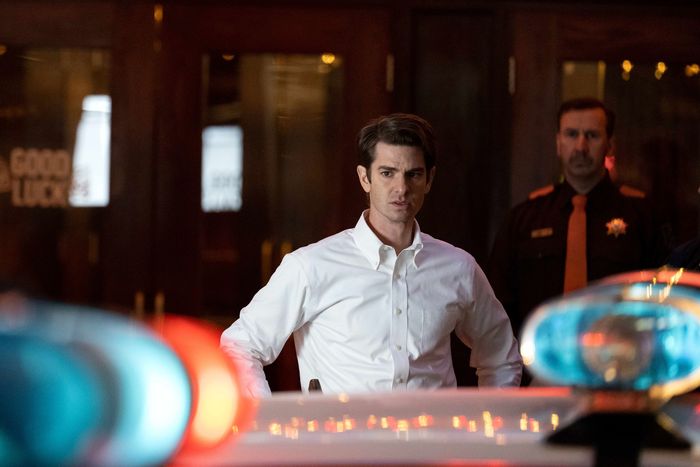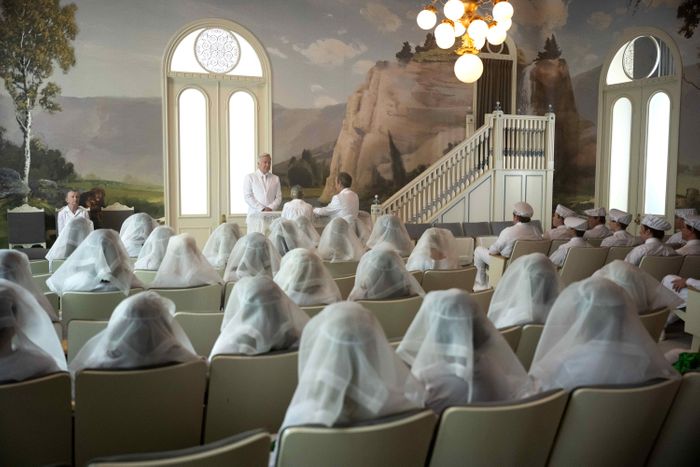
Despite being a true-crime series, Under the Banner of Heaven does not really deal in mysteries. Early on in the seven-episode miniseries, it’s clear that the Lafferty family is bad news — particularly dueling brothers Ron (Sam Worthington) and Dan (Wyatt Russell). It’s clear that the Church of Jesus Christ of Latter-day Saints maintains a strict gender hierarchy in which women’s roles are rigidly contained to wife and mother. And it’s clear, through flashbacks to Mormonism founder Joseph Smith (Andrew Burnap), that the murders of Brenda (Daisy Edgar-Jones) and Erica Lafferty are born out of a religious tradition that has, for decades, used obedience as one tool and violence as another. Finale “Blood Atonement” brings these threads together in an episode centered on Detective Jeb Pyre (Andrew Garfield) losing his faith, but Under the Banner of Heaven doesn’t let him entirely off the hook for his complicity. The problem was the patriarchy all along, and that’s no mystery.
Based on the nonfiction book by Jon Krakauer and adapted by former Mormon Dustin Lance Black, Under the Banner of Heaven makes a few significant changes to its source material. Krakauer divides his book roughly into thirds: The first introduces the murders, news coverage about them, and what has happened to Ron and Dan Lafferty in prison. The second, far heftier, middle third traces Mormonism and tells “a story of violent faith,” as Krakauer puts it. And the final third describes the Laffertys’ appeals and their lack of remorse through interviews with Dan. The miniseries, meanwhile, integrates material from Brenda’s journals and letters, transcripts from the ’80s trials, and Black’s interviews with Dan, Brenda’s widower — Allen — and Brenda’s parents. The result is three mostly linear narratives braided together: Brenda and Allen’s marriage and her entanglement with the increasingly fundamentalist Lafferty brothers, who turned against the U.S. government and toward polygamy; the investigation into who killed Brenda; and the history of the LDS Church.
Detectives Pyre and Bill Taba (Gil Birmingham) are True Detective–like inventions to guide us through this intertwined tale, and their push-pull dynamic adds some tension to the four days they spend on the case. As Pyre and Taba try to understand what could lead someone to so brutally murder a mother and her 15-month-old child, they listen as Allen (Billy Howle), his brothers Robin (Seth Numrich) and Sam (Rory Culkin), and nefarious Mormon Church leaders — like a man referred to only as the “General Authority” (Frank Moore) — recount their interactions with Brenda and share history lessons about what happened to Smith after he started Mormonism. “There’s a bounty of unusual up here,” a ranger tells Taba about the hills he patrols and the fundamentalist Mormons living off the grid there, but that’s not quite right. Instead, what Under the Banner of Heaven captures is the utter normalcy of such black-and-white thinking in this religion and this place. The sharp pressure Brenda felt from the Laffertys to fall in line and the way she wasn’t an anomaly. As consistent as Taba’s gum-chewing or Pyre’s earth-tone suits is the depiction of LDS ideology as one of masculine domination, and Under the Banner of Heaven communicates the privilege and smugness of that position in moments both big and small.
In the second episode, “Rightful Place,” Robin tells Allen, “Mind your property,” after he hears Brenda telling Dan’s wife, Matilda (Chloe Pirrie), to trust her gut and listen to the voice of the Holy Spirit on her own terms, and Brenda’s journalism teacher tries to pressure her into a sexual encounter (that she successfully rebuffs with a clever bit of blackmail) by telling her, “Smile real big for me.” In the third episode, “Surrender,” during Brenda’s wedding ceremony to Allen, she and the other women in the church are directed to be “queens and priestesses to your husbands,” and later on, Pyre’s Bishop Young (Graham Abbey) casually says many Mormon women take medication every day “to deal with their feelings.” (Edgar-Jones’s look of quiet panic as she mimics the church leader’s throat-slashing gesture is haunting.) In the fourth episode, “Church and State,” Dan informs Matilda that they’re now going to practice polygamy — with Russell nailing the gaslighting tone of, “If you could just get over your dang jealousy, you might see what a blessing this principle is for you too.” And in the back half of the season, the LDS leaders to whom Brenda, Matilda, and Ron’s wife, Dianna (Denise Gough), reach out for help abandon them over and over again. Husbands are to be honored and their decisions are to be followed, these women are told, and to go against that would be to reject God. “I did as the Church instructs us to do,” says the bishop’s wife (Judith Buchan), who suggests that Dianna try harder to please the increasingly violent Ron, and Taba’s aghast reaction is truly all of us.
It’s all bleak, awful stuff. Moreso when even the heroic Pyre engages in it, which is exactly the point. Under the Banner of Heaven illustrates how no one who grows up in this kind of environment can escape its influences — no matter how kind, progressive, or loving they think they are. That’s why it’s so jarring when Pyre transforms — from the man who says, “I love you,” during every phone call with his wife, Rebecca (Adelaide Clemens); tucks his daughters into bed each night; and gently invites his dementia-addled mother, Josie (Sandra Seacat), on daily walks — into a domineering “priesthood holder.” The decisions he makes as the family’s religious authority are ostensibly to protect his family from the doctrine he’s beginning to interrogate, but he still uses its male-exalting infrastructure to get what he wants.
In “Surrender,” he delays his daughters’ baptism as he worries about trapping them in Mormonism, and he refuses Rebecca’s appeal that she has “waited my whole life for this.” Standing across from her, his posture tall and his voice sure, Garfield’s Pyre is unmoved: “The decision’s been made. And as our priesthood holder, I need you to back me up on this — and I am not asking.” How different is that, really, from Dan’s urging of his brothers, “We need to assert absolute control in our married lives”? In “Revelation,” Pyre is unnerved by his mother’s insistence that she can’t get into Heaven without his blessing, but he ultimately goes through the motions — using bubble-bath suds in place of holy water — to calm her concerns. And in “Blood Atonement,” he’s shocked by the admissions and actions of both his daughter and his wife. An entry in his 8-year-old daughter’s journal describing how she hopes she’ll one day be “worthy” of a “righteous” husband unsettles him: How early does indoctrination in docility and surrender begin? A later reveal that Becca went to the church’s General Authority for advice about how to deal with his religious wavering, when she knows that he’s investigating the church’s involvement in the Lafferty case, infuriates him. “How could you go behind my back? Interfere?” he demands before banning her from doing so again, and although Pyre is right that the LDS faith is seemingly built on maintaining women as “eternal servants,” his toolbox is the same as those of other Mormon men.
It makes sense, then, that Under the Banner of Heaven argues that the only people who can break the toxic-masculinity chain are women. Although Brenda dies tragically, she succeeds in pulling Allen away from the church, and his realizations about the LDS history of bloodshed and patterns of subjugation later sway Pyre. In a subplot seemingly unique to the series, Dianna, who fled with her six children to Florida (evading Ron’s order for their blood atonement too), returns to Utah to save Matilda. The entire sequence plays out like an escape thriller — with Dianna breaking Matilda out of the Lafferty family home, where their mother-in-law, Doreen (Megan Leitch), had been keeping her locked in a closet, then tearing into Sam Lafferty when he follows them to a gas station and drags Matilda (“my brother’s property”) back to his car.
Dianna’s speech about how none of the Lafferty brothers is special or chosen and instead “small, weak” children blaming women for their failures feels like the purest distillation of Under the Banner of Heaven’s ethos, and Gough’s full-body performance crackles with rage. There’s a moment of levity when she snaps at Matilda to “get in the friggin’ car” and away from the chastened Sam. But as the camera cycles through all the men at the gas station — an employee, a man pumping gas, a van full of Boy Scouts, the father of a young girl — ignoring the altercation and refusing to help Dianna and Matilda, we’re reminded that the Lafferty brothers benefited from a worldview that emboldened them and justified their actions. Dianna and Matilda got out, but what about that little girl who watched them flee? When she grows up, what will her priesthood holder have her do?
Perhaps that’s why Under the Banner of Heaven doesn’t employ an end card to share what happened to Ron and Dan after their arrests — going against the true-crime genre’s usual instincts. (You’ll have to return to Krakauer’s book or do some light Googling to learn that both Laffery brothers were sentenced to life in prison — with Dan still incarcerated and Ron dying in prison in 2019.) Instead, the series wraps with two scenes questioning whether Pyre’s role as “priesthood holder” is permanent: By encouraging one of his daughters to say the family prayer and asking his mother to bless one of their walks as a “miracle” that doesn’t need God’s intervention to be worthwhile, Pyre steps away from the doctrine that guided his life up to this point. Under the Banner of Heaven concludes with uncertainty, but not because the miniseries denies us information about the Laffertys’ trials or prison stays. While the next steps in Pyre’s self-actualization are unknowable, the patriarchal system that created and protected men like him remains in place — and Under the Banner of Heaven doesn’t need a postscript to inform us of that.






